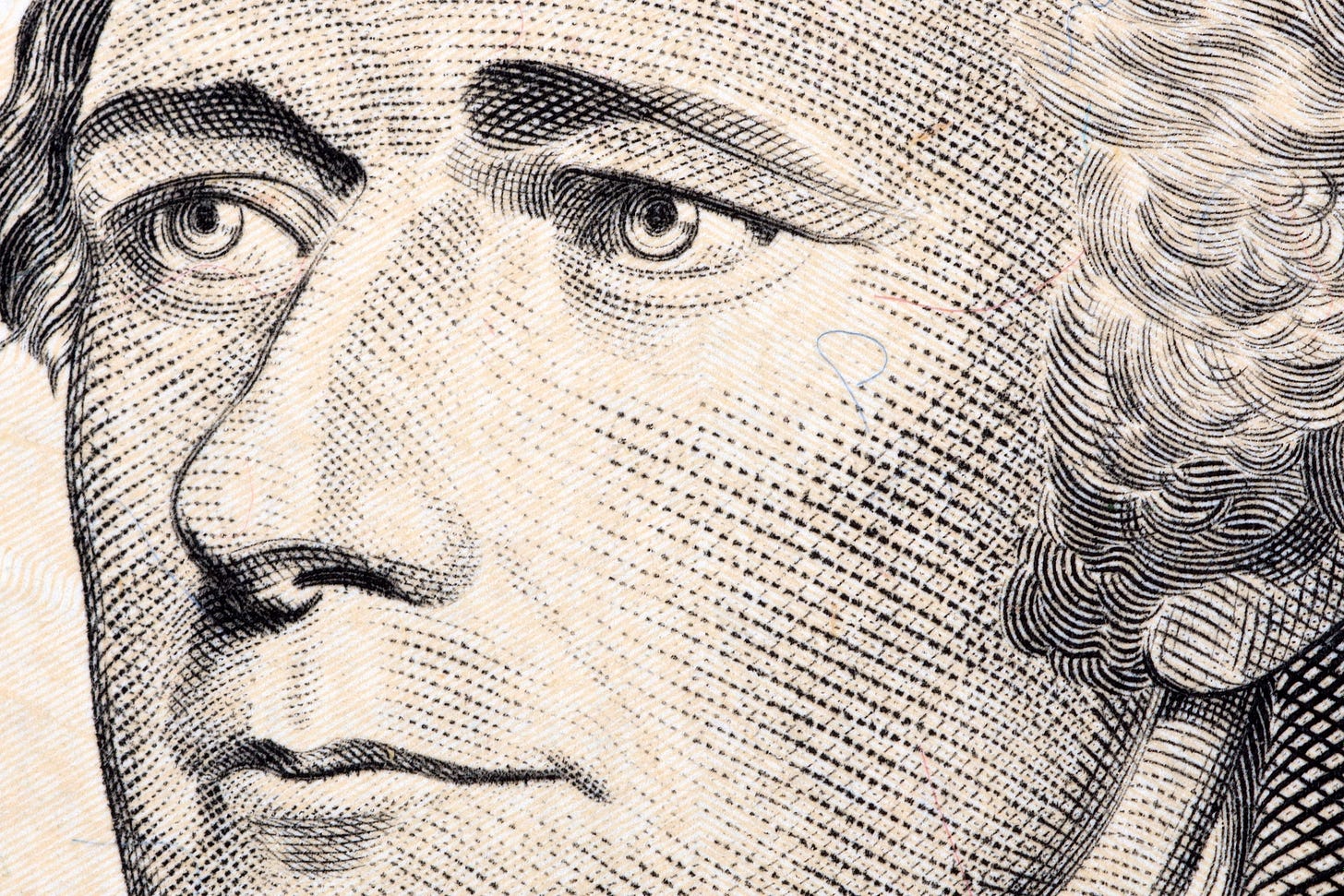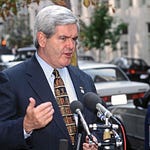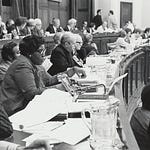Photo credit: Janusz Pienkowski/Shutterstock
It was May 12, 2009. A crowd had assembled at the White House for a program billed as “An Evening of Poetry & Music & The Spoken Word.” Barack Obama, the first Black President of the United States, and his wife Michelle, had been in residence for less than five months.
I doubt that anyone remembers who else performed that night. But the next day, the historians’ network was chattering about a skinny kid with a buzzcut, a graduate of Wesleyan University, who had recently had a more than modest success with the musical he wrote for his senior project. And that evening, to the delighted laugh of the new President, Lin-Manuel Miranda announced that he was going to present a hip-hop song about the first Secretary of the Treasury.
“Alexander Hamilton,” he deadpanned, as the dignitaries in front of him laughed. As an aside, you must wonder what the actual Secretary of the Treasury, Timothy Geithner, felt about the hilarity. And then Miranda’s accompanist and long-time musical director hit the opening chords:
Almost six years later, in February 2015, Miranda’s full show, “Hamilton: The Musical,” debuted at The Public Theater, an Off-Broadway venue in Lower Manhattan with a reputation for incubating hits. “Hamilton” moved to Broadway in late summer, where it became a cultural and sociological phenomenon, spawning YouTube imitators by the hundreds, multiple traveling companies and a London production. Hamilton has remained at the Richard Rodgers Theater ever since. It re-energized a popular fascination with Early American history, and with the Founding Fathers, inspiring tourists to roam New York to visit sites associated with Hamilton, a man who, previously, had been best known perhaps for being shot and killed in his prime by Vice President Aaron Burr.
Although Founding Fathers come in and out of fashion, “Hamilton: The Musical” was special in many ways. It flipped everything, using hip-hop to tell the story of the nation’s founding, and an ensemble cast of Black and Brown actors who challenged audiences to re-interpret national heroism through bodies of color. You can read more about this phenomenon in a book of essays I edited with Renee C. Romano, Historians on Hamilton: How a Blockbuster Musical Is Restaging America's Past (Rutgers University Press, 2018.)
But in the end—and in the beginning, actually, since the musical was based on Ron Chernow’s 2004 Pulitzer Prize-winning biography of Hamilton—Miranda’s musical was great man history and told a great man story. Yes, there were terrific female characters, but “Hamilton“ repeated familiar tropes: an empty continent waiting to be filled up by white people, a band of brothers risking everything to bring a country into being, a nation that was extraordinary because the Founders were extraordinary.
The founding as portrayed in “Hamilton” was nostalgic for a lost world of ideas, ambitions, and growth. That wasn’t the real world of those turbulent years. More significantly, perhaps, it was not the real world of 2015, when the United States was veering ever more sharply into talk of borders, limits, partisanship, and lies.
Here’s another problem with great man history: it deadens the true excitement of the Early American nation, oversimplifying a world that was just as full of schemers, dreamers, alternative futures, and fascinating bit players as our political world is today.
And that means we have more myth-busting to do, listeners. Today’s guest is William Hogeland, author of a new book on the period, The Hamilton Scheme: An Epic Tale of Money and Power in the American Founding(Farrar, Straus, & Giroux, 2024). As Bill tweeted recently “People *really like* the Jefferson-vs.-Hamilton binary as an explanation of American history, and The Hamilton Scheme is out to smash it. Not just triangulate it by reviving the 18th c. labor activists (that too),” he promised. “Jeffersonianism turns out to be only Hamilton-lite.”
Tempting, isn’t it? And there is so much more in this wonderful book, whether you are a Hamilton fan, love the complexity of Early America, or (and I know some of you are out there) whether you are just a finance nerd and think nonstop about the national debt.
So, join Bill and me for this episode of “Why Now?” where history and politics meet the challenge of today.
And I’m your host, Claire Potter, Professor of History emeritus at the New School for Social Research, a contributing editor at Public Seminar, and the author of the Political Junkie Substack.
This is Episode 55, “The Ten-Dollar Founding Father.”
Show notes:
Bill mentions Hamilton’s friend and ally Robert Morris, a Pennsylvania Merchant. You can read more about Morris in an earlier book, Founding Finance: How Debt, Speculation, Foreclosures, Protests, and Crackdowns Made Us a Nation (University of Texas Press, 2012).
Claire mentions the question of why slavery was preserved at the founding, a topic that has been explored by David Waldstreicher, Slavery's Constitution: From Revolution to Ratification (Hill & Wang, 2009).
Bill talks about Hamilton and others understanding that the economic world was becoming transformed through early industrialization. You can understand what they saw in Eric Hobsbawm’s Industry and Empire: The Birth of the Industrial Revolution (The New Press, 1999).
The deficiencies of the Articles of Confederation, and the move to a federal Constitution, is the subject of Joseph Ellis’s The Quartet: Orchestrating the Second American Revolution, 1783-1789 (Knopf, 2015).
Claire mentions the classic account of the Constitutional Convention, Catherine Drinker Bowen’s Miracle At Philadelphia: The Story of the Constitutional Convention May-September 1787 (Little, Brown & Company, 1966).
Bill discusses the valuable ideas in Thomas Paine’s Common Sense: The Organization and Design of Government (1776).
Bill mentions the radicalism of the Whiskey Rebellion; he has written about it in The Whiskey Rebellion: George Washington, Alexander Hamilton, and the Frontier Rebels Who Challenged America's Newfound Sovereignty (Scribner, 2006).
You can download this podcast here or subscribe for free on Apple iTunes, Spotify, Google Podcasts, or Soundcloud. You can also keep up with Political Junkie content and watch me indulge my slightly perverse sense of humor on X, Instagram, Threads, and TikTok.
If you enjoyed this episode, why not try:
Episode 51, MAGA Is the Newest, and Oldest, American Myth: A conversation with American Studies scholar Richard Slotkin about his new book, "A Great Disorder: National Myth and the Battle for America"
Episode 21, A World To Win: Talking with socialist feminist Nancy Fraser about her recent book, "Cannibal Capitalism: How our System Is Devouring Democracy, Care, and the Planet – and What We Can Do About It."
Episode 14, The Past Is Never Dead: A conversation with historians Kevin Kruse and Julian Zelizer about their new, best-selling essay collection, "Myth America: Historians Take on the Biggest Legends and Lies About Our Past."














Share this post